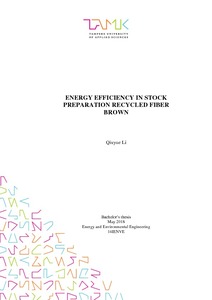Energy Efficiency in Stock Preparation Recycled Fiber Brown
Li, Qiuyue (2018)
Li, Qiuyue
Tampereen ammattikorkeakoulu
2018
All rights reserved
Julkaisun pysyvä osoite on
https://urn.fi/URN:NBN:fi:amk-2018053111443
https://urn.fi/URN:NBN:fi:amk-2018053111443
Tiivistelmä
Recycled fiber is widely used nowadays in the forest resource lacking country, but the challenge is that the recycled fiber is not as clean as virgin fiber. In order to meet defined fiber quality before sending to paper machine approach system, stock preparation is needed. The recycled fiber studied in this thesis is old corrugated container, which is a popular raw material in brown fiber utilization.
This study was held in a paper mill in China which consumed OCC as raw material. The separation processes’ energy efficiency were analyzed in this paper. The separation processes here referred to screening, fractionation and centrifugal cleaning. Exploring the pumping system and screen motor energy efficiency was the main focus of this thesis. By the end of the study, the recommendation of the pumping system and potential cost-saving expectation was provided.
In this paper, totally 9 separation processes including 24 pumps, 12 screens were investigated. During the investigation period, all the equipment were running in a normal condition without major problems except slightly higher energy consumption than optimized OCC line. A mathematical calculation was used to evaluate the efficiency. According to the analysis, most of the pumps and screens were running at a moderate efficiency.
Nevertheless, there were pumps that could be further improved to save energy. In order to predict the energy saving potential of pumps, the total dynamic head was introduced to compute the optimized pump efficiency. At the end of the study, it was found that there was a window of opportunity to improve the pumping system energy efficiency. If the stock preparation system would run under the desired condition, there could be hundreds thousands euro savings annually.
Energy consumed in stock preparation system is electrical energy generated by power boiler which burns coal as fuel. As a nonrenewable natural resource, it will not only increase environmental burden but it is also against sustainable development. Although there are alternatives to fossil fuels, cutting electricity consumption from its origin (e.g. lower the equipment energy consumption) is also a good measure to both economy and environment.
This study was held in a paper mill in China which consumed OCC as raw material. The separation processes’ energy efficiency were analyzed in this paper. The separation processes here referred to screening, fractionation and centrifugal cleaning. Exploring the pumping system and screen motor energy efficiency was the main focus of this thesis. By the end of the study, the recommendation of the pumping system and potential cost-saving expectation was provided.
In this paper, totally 9 separation processes including 24 pumps, 12 screens were investigated. During the investigation period, all the equipment were running in a normal condition without major problems except slightly higher energy consumption than optimized OCC line. A mathematical calculation was used to evaluate the efficiency. According to the analysis, most of the pumps and screens were running at a moderate efficiency.
Nevertheless, there were pumps that could be further improved to save energy. In order to predict the energy saving potential of pumps, the total dynamic head was introduced to compute the optimized pump efficiency. At the end of the study, it was found that there was a window of opportunity to improve the pumping system energy efficiency. If the stock preparation system would run under the desired condition, there could be hundreds thousands euro savings annually.
Energy consumed in stock preparation system is electrical energy generated by power boiler which burns coal as fuel. As a nonrenewable natural resource, it will not only increase environmental burden but it is also against sustainable development. Although there are alternatives to fossil fuels, cutting electricity consumption from its origin (e.g. lower the equipment energy consumption) is also a good measure to both economy and environment.
